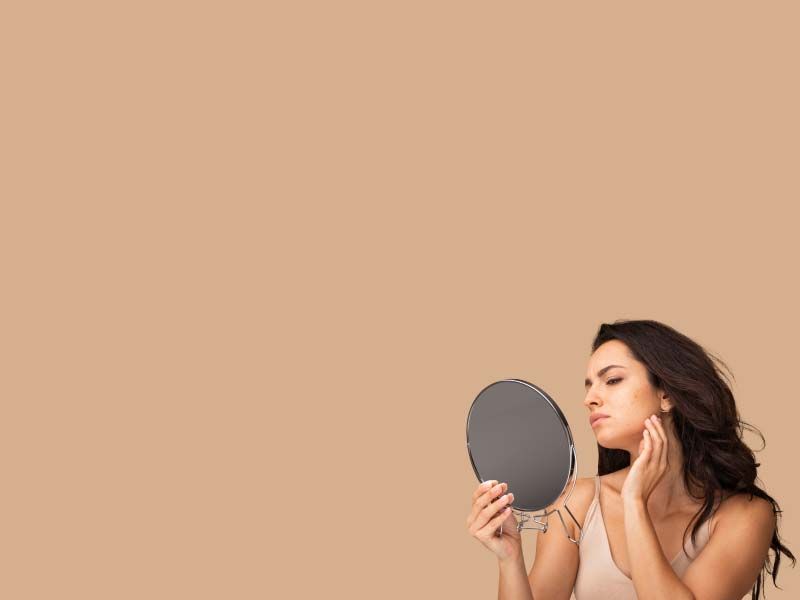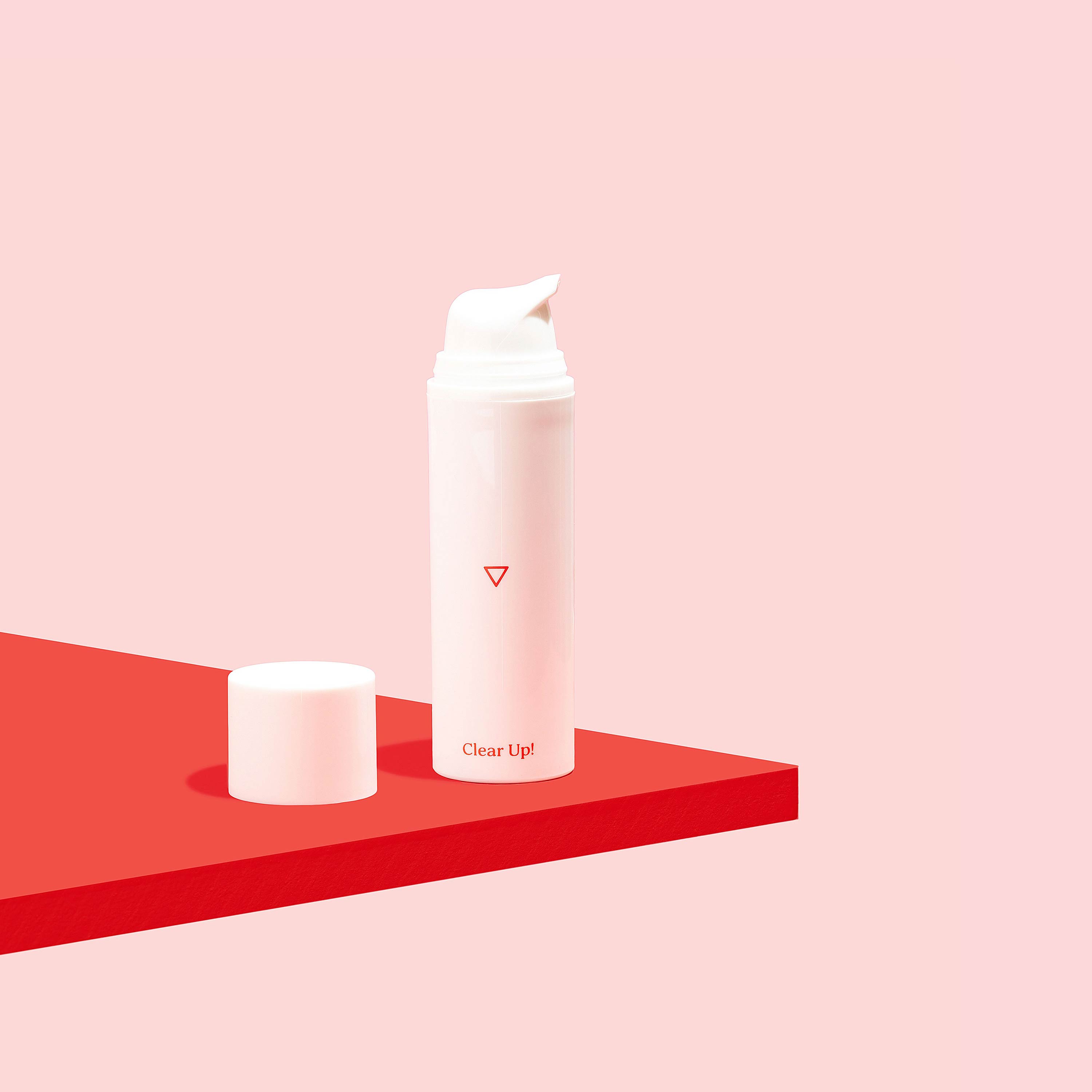
Written by Kathleen Morrison
Medically Reviewed by Andrea Sleeth WHNP-BC, MSCP
Ever wonder if those late-night scrolling sessions are secretly messing with your skin? The answer: yep, sleep (or the lack of it) can play a role. When your body doesn’t get enough rest, stress hormones like cortisol can spike. That extra hormone activity can crank up oil production, which can clog pores and lead to breakouts.
But let’s be real—poor sleep quality isn’t the only player here. Your skin responds to a mix of factors: what you eat, how you care for it, and even daily habits like hydration and stress management.
Think of it this way: understanding the sleep-skin connection is just one piece of the puzzle. When you pair better rest with mindful skincare and acne solutions, like prescription acne cream, can help make clear skin more achievable. It’s all about balance, consistency, and giving yourself a little grace along the way.
How sleep affects your skin health
Sleep isn’t just beauty rest, it’s a full-on skin reset. When your sleep tank runs low, your body goes into overdrive trying to catch up, and your skin feels it in a big way.
Skin barrier repair
Your skin barrier is like your body’s personal shield. It locks in moisture and keeps the unwanted stuff out. While you snooze, your skin is busy repairing itself, making ceramides and lipids that keep it smooth and strong. Skip the beauty sleep, and this repair slows way down.
- Getting less than your recommended 7–9 hours of sleep? Your skin can lose moisture faster and take longer to bounce back.
- Sensitive, dry, or irritated skin can flare up.
- Acne-prone skin struggles even more: bacteria can sneak in, inflammation spikes, and breakouts may get worse.
Cortisol, oil, and breakouts
Here’s where sleep and hormones collide: sleep deprivation makes cortisol (the stress hormone) kick into high gear.
- Cortisol signals your sebaceous glands to crank out more oil.
- More oil + dead skin cells + bacteria = prime conditions for breakouts.
- Inflammation ramps up, making skin more reactive and acne harder to manage.
In these cases, prescription topical spironolactone can be a game-changer—it targets hormone-related acne, including the kind triggered by sleepless nights.
Bottom line: consistent, quality sleep isn’t just about feeling rested—it’s a secret weapon for helping maintain healthy, balanced skin. Your skin actually thrives when you treat it to adequate sleep.
Wisp treatment options are available only after consultation with a licensed medical professional. You should consult with your healthcare provider before starting a new supplement or treatment regimen. Individual results may vary.
Signs your sleep may be harming your skin health
Your skin is the ultimate truth-teller: if you’re not getting enough sleep, it’s one of the first places to spill the tea. Spotting these signs early means you can start shifting habits (or calling in a little backup) before your skin feels totally out of balance.
Dark circles and puffiness
You know those “I was up way too late” under-eye circles? Yeah, they’re not just cosmetic. When you skimp on sleep, blood vessels under that delicate eye skin become more noticeable, and your body holds onto extra fluid... Hello puffiness.
But here’s the kicker: poor circulation from lack of sleep doesn’t just hit your eyes. Your whole face can miss out on the oxygen and nutrients it needs, slowing down cell turnover. That means dead skin cells pile up, pores stretch, and suddenly, acne has the perfect environment to show up uninvited.
Clogged pores and flare-ups
Sleep is prime time for skin renewal, and when you cut it short, exfoliation slows way down. Dead skin cells stick around, mixing with oil and clogging your pores. Cue more blackheads, whiteheads, and sometimes even those deep, painful breakouts.
And if you’ve noticed flare-ups happening like clockwork after a few restless nights? That’s no coincidence. Breakouts from poor sleep may be a little angrier and heal more slowly because your immune system is running on empty. Acne support like tretinoin can help calm the chaos and support your skin while you work on catching more zzzs.
Dull, uneven complexion
Glow? What glow? When your sleep schedule is off, your skin misses out on its natural repair cycle. Without that nightly reset, your complexion can look tired, patchy, or just blah. It’s not your imagination—your skin cells literally aren’t turning over as quickly, which makes your face feel less fresh.
The good news: once you start giving your body consistent rest, your glow bounces back (and faster than you think).
How to build a bedtime skincare routine that works
Your nighttime routine doesn’t need to be a 10-step, influencer-level production. Think of it more like giving your skin a little TLC before it clocks in for its overnight repair shift. A few intentional steps can help your skin reset—even on those nights when sleep isn’t on your side.
Cleanse and moisturize (yup, the basics)
- Gentle cleanser: Removes oil, sweat, and makeup without stripping your skin. Harsh cleansers can make your skin overproduce oil, which you don’t want.
- Moisturizer: Even oily or acne-prone skin needs hydration. Lightweight, non-comedogenic formulas keep your skin calm and balanced overnight.
- Timing matters: Cleanse right before bed to avoid transferring pillowcase grime back onto your skin.
- Consistency over perfection: Even on tired nights, try your best to stick to this simple cleanse and moisturize routine. Your skin will still thank you.
Additional treatments for acne-prone skin
- Targeted ingredients: Salicylic acid clears pores, while niacinamide calms inflammation and balances oil.
- Hormonal breakouts: Prescription oral spironolactone can help address acne caused by hormonal fluctuations, and you can get a hold of it with an online consult.
- Spot treatments: Use benzoyl peroxide sparingly on individual pimples. Start low for sensitive skin and build up if needed.
- Long game mindset: Consistency beats aggressive routines. Treating acne overnight doesn’t exist, but steady care works wonders.
Healthy habits for easier sleep
Better sleep isn’t just about feeling less zombie-like—it’s also a secret weapon for clearer, happier skin. A few simple tweaks to your nightly routine can help make a difference in how you rest and how your skin shows up the next day.
Set a sleep schedule
Your body loves a little routine, and your skin loves it, too. Hitting the pillow and waking up around the same time each day helps your internal clock stay on track, which keeps the hormones that affect oil production and skin repair happy.
Pick a bedtime that actually works for you, and aim for seven to nine hours (yes, even on weekends). Sleeping in to “catch up” can backfire, so if you need extra zzz’s, try going to bed a bit earlier instead.
Create a mini wind-down ritual: dim the lights, stash your phone, maybe stretch a little. Think of it as telling your body, “Hey, it’s chill time.” Pair these habits with the right skincare solutions, and you’re giving your skin the ultimate overnight glow-up.
Keep your bed skin-friendly
Your bedroom is basically your skin’s home base, so it’s worth making it comfy (and clean). Pillowcases collect oil, dead skin, and bacteria, which can sneak back onto your face at night. Swapping them out a couple times a week keeps things fresh and acne-friendly.
Think about materials, too. Silk or satin pillowcases are smooth and gentle, while cotton can tug and absorb moisture. Keep your room cool so you’re not waking up in a sweat, and keep the air in check. A humidifier around 40-60% humidity hits the sweet spot, keeping skin hydrated and your sleep comfy.
Skip late-night pick-me-ups
Evening coffee or sugary snacks might feel like a well-deserved treat, but they can spike stress hormones, keeping you wide awake and your skin a little grumpy.
Swap in calming drinks like herbal tea or water, and give your body and skin a chance to wind down naturally.
Bonus habit: Keep your phone out of bed
We all love scrolling in bed, but that glow from your screen is basically a “stay awake!” signal for your brain. Charge your phone across the room and let your brain focus on sleep instead of likes, texts, or doomscrolling. Your skin and your mental health will thank you.
Sleep, skin, and annoying breakout cycles
So, does lack of sleep cause acne for real? Unfortunately, yes, it can be a trigger. When you’re not catching enough zzz’s, your skin barrier struggles to repair itself, stress hormones spike, and oil production goes into overdrive: all creating the perfect storm for breakouts. Research consistently shows that both how long and how well you sleep matters for healthy, clear skin.
The good news? Combining better sleep habits with thoughtful but simple skincare makes a real difference. Keep a consistent bedtime routine, use gentle yet effective products, and make your sleep environment skin-friendly. Wisp’s expert-guided treatments, like topical spironolactone, make it easy to get professional care from home—quick, convenient, and totally judgment-free.
Ready to take charge? Schedule a Wisp consultation today and get personalized skincare guidance delivered straight to your door.
This blog post is for informational and educational purposes only and should not be taken as professional advice. Always consult with a qualified professional before making any decisions based on the information provided here.





